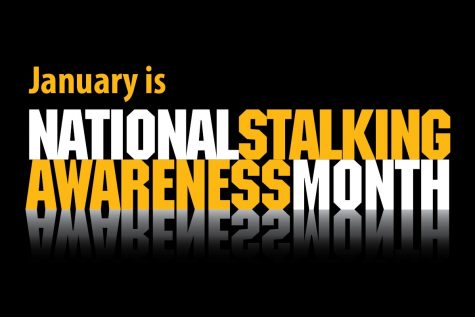Stalking Awareness Month: VPAC shares what you need to know
Jan 30, 2020
For many college students, stalking is a serious and potentially dangerous issue. John Carroll University’s Violence Prevention and Action Center is helping to spread stalking awareness throughout the month of January, which is Stalking Awareness Month.
Stalking Awareness Month is a nationally recognized campaign used to spread awareness about stalking to help people be informed and safe from potential stalking situations.

John Carroll University’s Violence Prevention and Action Center, or VPAC, held some events on campus last week to spread the word about stalking situations, and what resources students can access if they find themselves in such a position.
Melissa Santana, program coordinator for VPAC, shared more about what exactly stalking is. “Stalking is any unwanted contact that occurs between one person and another. It could be somebody that, yes, you were in a romantic relationship with, or it could be somebody that just might know you from work, or from campus it could be a fellow student. The majority of the time, though, it is somebody you know, where there is some kind of connection.”
Another key component of stalking, in addition to unwanted contact, is harassment. “If they are constantly calling your phone, if they asked you to always keep your location on, and just always wanting to know what you’re doing to the point where you’re not able to do normal things without having to check in with that person, that’s definitely harassment. But it’s also doing it without your knowledge,” explained Santana.
Santana warned that “if people magically end up in a lot of the places that you’re at without being asked, it might be that they’re following you, just in a way that you don’t know.”
Santana also explained that people often hold misconceptions about what type of person could be a stalker. “It’s smart people that are doing the stalking. I mean, we’d like to think that it’s just some weird person that has nothing better to do with their time, but no, there are charming and really intelligent people that do it.
“As a result, people usually have a really hard time believing that it’s them doing it because they tend to be people that are really well liked. They’re definitely not creepy people that are hiding behind computers,” said Santana.
Santana also explained how students at John Carroll specifically might experience stalking. “It’s a smaller campus, but parties still happen, we have classes and students meet people in different places,” said Santana. New contact can easily lead to unwanted contact, which could turn into a potential stalking situation.
“We also have a lot of residential students. This is where they live and do all of their activities.
“So, if somebody wants to follow you and predict your schedule, it’s not incredibly difficult to do that,” said Santana.
Knowing what is and isn’t stalking can sometimes be a tough thing to determine, said Santana.
“There definitely are some people that would consider a lot of contact to be flattering. A lot of people often think, like, ‘oh, that person really likes me. They seem to be really attentive to my needs, and they’re always checking in on me.’ But there are times when that can take a turn.”
If a JCU student recognized he or she was being stalked, which can be one of the biggest hurdles in seeking help, Santana shared some steps he or she could take to receive assistance. “If you start to recognize the patterns, it’s always helpful to collect evidence on the matters. One, because it helps you come to terms with it, but also in order for you to help your friends or anybody else to understand that something was happening, including making a formal report.”
If someone comes to VPAC about stalking, they can help in several ways. One way they help is to connect people to outside resources, like the Cleveland Rape Crisis Center, or the Domestic Violence and Child Advocacy Center.
“Another way is through safety planning. “That includes the little things where I might switch up your schedule a little bit, or make your route a little more unpredictable. Maybe you start to not go to the same places that you always frequent,” said Santana.
Safety planning can also help students test whether or not someone is actually stalking them. “If you switch things up, and they are still there, that’s a huge warning sign,” asserted Santana.
VPAC held three tabling events last week, in the atrium and outside of Einstein’s Bagels, where they displayed information and Santana engaged in conversation with students about stalking.
“I just want the conversation to happen, so people know that stalking does exist, and that if you experience it, even if it’s in the most subtle way, we’re here to help,” said Santana.
Other than stalking, the VPAC office can help students navigate many different types of relational problems. “A lot of students associate my office with the sexual assault, or more specifically rape. And absolutely, if something has happened to you [that’s] that severe, I would want you to come in. But when it comes to relationships, there are a lot of relationships that we deal with in our lives that affect who we are as people and our everyday activities. Some of them are romantic, yes, but some of them are family relationships or friendships.”
Santana encourages JCU students to follow VPAC on Instagram, @VPAC_JCU for more information and tips to stay safe.
“You deserve to have a safe experience on campus, no matter what’s happening. And we can help you do that. It’s exactly why we’re here.”












